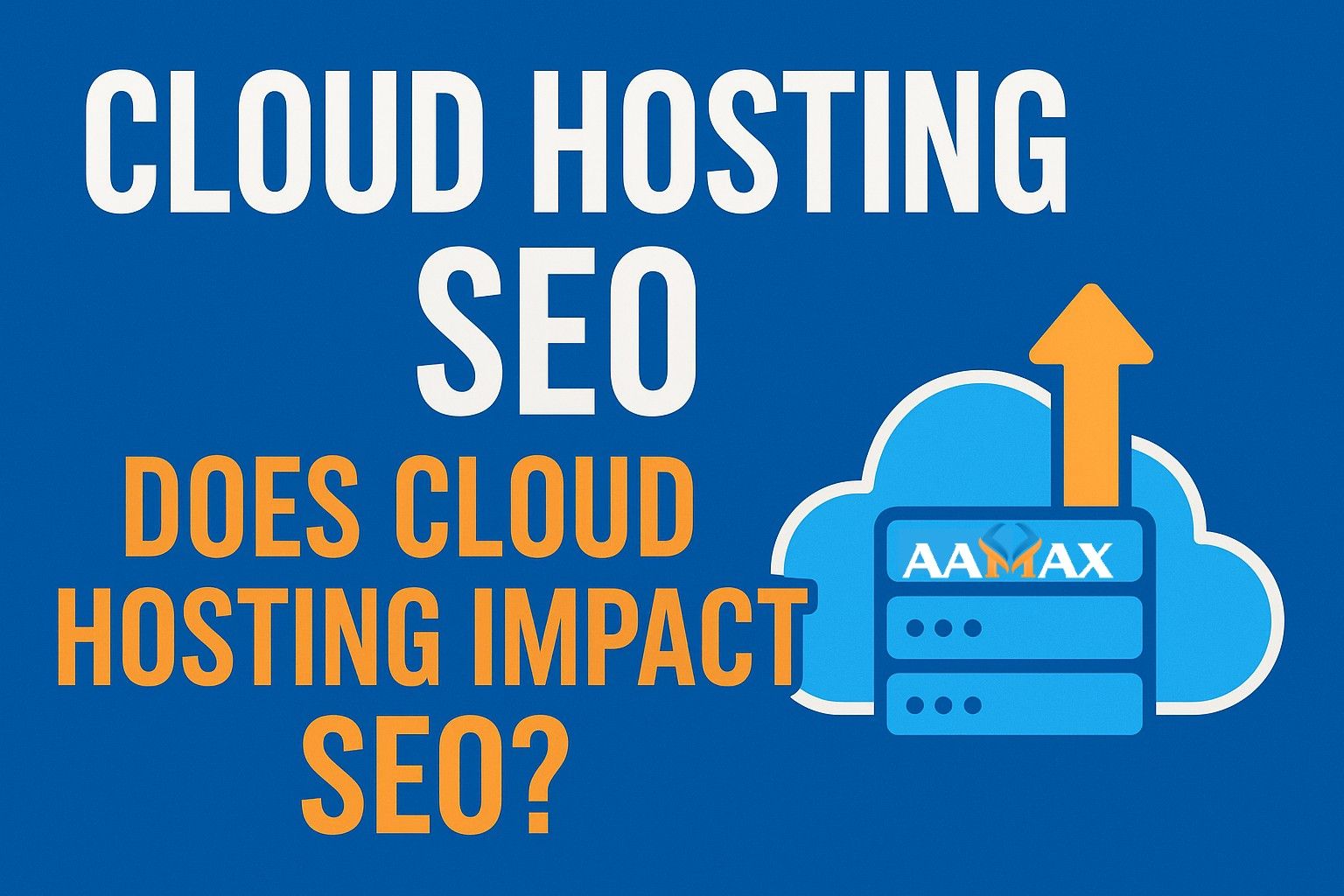
Cloud Hosting SEO | Does Cloud Hosting Impact SEO?
In the digital world, your website’s visibility depends on how well it performs — and that performance starts with your hosting environment. Cloud hosting has rapidly become the preferred choice for businesses seeking speed, scalability, and reliability. But one question that often arises is: does cloud hosting impact SEO?
The short answer is yes — and in several powerful ways. While hosting itself isn’t a direct ranking factor, it heavily influences factors like site speed, uptime, user experience, and security, all of which play a critical role in SEO services.
In this detailed guide, we’ll explore how cloud hosting affects your search rankings, what advantages it offers over traditional hosting, and how you can leverage it for better SEO performance.
What Is Cloud Hosting?
Before diving into SEO implications, it’s essential to understand what cloud hosting actually is.
Unlike traditional hosting (which relies on a single physical server), cloud hosting distributes your website’s data and resources across a network of multiple interconnected servers. This network — or "cloud" — ensures that if one server experiences issues, another automatically takes over, keeping your site stable and accessible.
Key Features of Cloud Hosting
- Scalability: Easily handle traffic spikes without downtime.
- Reliability: Reduced risk of outages since multiple servers back up your data.
- Speed: Optimized performance through global server distribution.
- Cost Efficiency: Pay only for the resources you use.
- Flexibility: Ideal for both small businesses and enterprise-level websites.
This dynamic infrastructure not only improves user experience but also supports SEO-critical performance metrics.
How Hosting Affects SEO
Google’s ranking algorithm considers hundreds of factors, many of which are indirectly tied to your hosting quality. Even though the search engine doesn’t explicitly rank websites based on hosting type, poor hosting can lead to technical issues that drag your rankings down.
Key Hosting-Related SEO Factors:
- Website Speed and Performance
- Server Uptime (Availability)
- Server Location (and Latency)
- Security and HTTPS Support
- Scalability and Traffic Management
- User Experience (UX)
Cloud hosting positively impacts all of these areas — making it one of the smartest choices for SEO-conscious website owners.
1. Website Speed: A Core SEO Factor
One of the biggest advantages of cloud hosting is faster load times. Google has explicitly stated that page speed is a ranking factor for both desktop and mobile searches.
Why Speed Matters for SEO:
- Faster sites lead to lower bounce rates.
- Google prioritizes websites that deliver a great user experience.
- Improved Core Web Vitals (like LCP, FID, and CLS) signal better performance.
Cloud hosting achieves superior speed because your website’s data is spread across multiple servers. When a user visits your site, the nearest server delivers content — minimizing latency and load times. This geographical efficiency is especially beneficial for global businesses.
Example:
If your website is hosted on a cloud network with servers in North America, Europe, and Asia, users in each region access your site from the closest data center. The result? Faster response times and happier visitors — which translates to better SEO performance.
2. Uptime and Reliability: Keep Your Site Always Available
Downtime can be devastating for SEO. If Googlebot tries to crawl your site and finds it unavailable, it may interpret this as poor reliability. Frequent downtime could even lead to deindexing of certain pages.
Cloud Hosting Advantage:
- 99.9% or higher uptime guarantees
- Automatic failover systems that reroute traffic to active servers
- Load balancing to handle high-traffic events without crashes
In contrast, traditional shared hosting often relies on a single server, meaning that if it fails, your website goes offline. Cloud hosting virtually eliminates this risk, ensuring consistent uptime and maintaining your SEO integrity.
3. Server Location and Latency: Impact on Page Speed and Rankings
Where your server is physically located can influence how quickly users from different regions access your website. This is especially true for international businesses that target multiple countries.
How Cloud Hosting Solves This
Cloud hosting leverages Content Delivery Networks (CDNs) and globally distributed data centers to minimize latency. Whether your visitor is in London, New York, or Tokyo, they’ll receive content from the nearest available node.
By improving global load times, cloud hosting helps websites perform better in geo-targeted searches and provides a seamless experience to users worldwide.
4. Scalability: Handle Growth Without Slowing Down
As your business grows, so does your website traffic. Traditional hosting often struggles under heavy loads, resulting in slow performance or downtime during peak times.
Cloud hosting offers on-demand scalability, meaning you can instantly increase (or decrease) server resources like CPU, RAM, and bandwidth as needed. This flexibility ensures that your site remains fast and stable even when traffic spikes — such as during product launches or holiday sales.
SEO Benefit:
Google tracks how users interact with your site. If pages load slowly or fail to respond, visitors leave — increasing your bounce rate, which negatively impacts rankings. Cloud hosting prevents that by maintaining consistent performance regardless of traffic levels.
5. Security: Protecting User Data and SEO Rankings
Website security has become a top priority for Google. Sites with security vulnerabilities risk not only being hacked but also being penalized or blacklisted from search results.
Cloud hosting enhances security through:
- Advanced firewalls and DDoS protection
- Automated data backups
- SSL certificate integration (HTTPS)
- Isolation of resources to prevent cross-site contamination
HTTPS encryption is a confirmed ranking signal, and cloud platforms make SSL implementation easy. Moreover, Google prefers secure websites that protect user data, improving trust and overall SEO authority.
6. Better Crawlability and Indexing
Google’s bots constantly crawl your website to discover and index content. If your site is slow or frequently inaccessible, crawlers might fail to index it properly.
How Cloud Hosting Helps:
- Faster server response times improve crawl efficiency.
- Reliable uptime ensures crawlers always find your pages live.
- Optimized bandwidth allows smooth indexing of large websites.
A well-performing, always-available website sends positive signals to Google that your content is reliable, which can improve crawl frequency and ranking consistency.
7. User Experience (UX) and SEO Go Hand-in-Hand
SEO today is as much about user experience as it is about keywords and backlinks. Google’s algorithm uses metrics like dwell time, bounce rate, and page interactions to determine whether your content satisfies user intent.
A slow or unstable website frustrates users, leading them to abandon it quickly. Cloud hosting enhances UX by ensuring:
- Instant load times
- 24/7 availability
- Smooth navigation across devices and regions
When visitors stay longer and interact more, it tells Google your website offers value — resulting in better rankings.
8. Cloud Hosting and Core Web Vitals
Core Web Vitals are a set of metrics introduced by Google to measure real-world user experience. They include:
- LCP (Largest Contentful Paint): Measures loading performance
- FID (First Input Delay): Measures interactivity
- CLS (Cumulative Layout Shift): Measures visual stability
Cloud hosting can significantly improve these metrics through high-performance server architecture, caching systems, and content delivery networks. The result is smoother interaction and higher SEO scores.
9. Cost Efficiency Without Compromising SEO
Many businesses hesitate to switch to cloud hosting due to perceived costs. However, most providers use a pay-as-you-go model, meaning you only pay for the resources you consume. This makes it ideal for startups and established enterprises alike.
By investing in cloud hosting, you’re not just upgrading your infrastructure — you’re investing in SEO performance, site security, and long-term growth.
10. How to Choose the Right Cloud Hosting Provider for SEO
Not all cloud hosts are created equal. The wrong provider could still slow down your website or limit customization options. To maximize your SEO benefits, consider the following:
What to Look For:
- High-speed global servers
- Built-in CDN and caching support
- Uptime guarantee (99.9% or higher)
- Free SSL certificates and DDoS protection
- 24/7 technical support
- Data center locations near your target audience
Choosing a reliable provider ensures you get the full performance and SEO benefits that cloud hosting offers.
11. Does Google Prefer Cloud-Hosted Websites?
While Google doesn’t officially favor cloud-hosted websites, the technical advantages of cloud hosting align perfectly with Google’s ranking signals. Faster sites, improved uptime, secure connections, and great user experiences all contribute to higher rankings — making cloud hosting an indirect yet powerful SEO booster.
In other words, cloud hosting doesn’t make your site rank higher by itself, but it creates the perfect environment for your SEO strategy to succeed.
12. Cloud Hosting vs. Traditional Hosting for SEO
| Feature | Cloud Hosting | Traditional Hosting | |----------|----------------|--------------------| | Speed | Fast, distributed servers | Often limited by single server capacity | | Uptime | 99.9% or higher | Risk of frequent downtime | | Scalability | Instantly adjustable | Fixed resources | | Security | Advanced and isolated | Shared risk across users | | Global Reach | Multi-region data centers | Single-region access | | SEO Performance | Optimized and reliable | Limited and inconsistent |
The comparison clearly shows why cloud hosting outperforms traditional setups in nearly every SEO-related aspect.
13. Real-World Example: SEO Impact of Switching to Cloud Hosting
A mid-sized eCommerce brand switched from shared hosting to a cloud platform and noticed:
- Page load times improved by 58%
- Bounce rates dropped by 23%
- Organic search traffic increased by 32% within 3 months
These improvements were a direct result of better hosting infrastructure — not changes in content or backlinks. It proves how cloud hosting indirectly but significantly strengthens SEO performance.
Partner with Experts to Optimize Your Hosting and SEO
To get the full benefits of cloud hosting for SEO, it’s important to pair the right infrastructure with a smart optimization strategy. That’s where professionals come in.
AAMAX — a full-service digital marketing company offering Web Development, Digital Marketing, and SEO Services. The AAMAX team specializes in building lightning-fast, cloud-optimized websites designed to perform better in search rankings. From hosting configuration and technical SEO to site speed optimization, AAMAX ensures your business stays ahead of the competition.
Final Thoughts
So, does cloud hosting impact SEO? Absolutely — and in all the right ways.
While it’s not a direct ranking factor, cloud hosting influences every major performance metric that search engines care about: speed, uptime, security, scalability, and user experience. It provides the foundation for a stable, high-performing, and SEO-friendly website that can scale with your business.
If you’re serious about improving rankings, enhancing performance, and providing an exceptional user experience, switching to cloud hosting is one of the smartest investments you can make. Combined with expert SEO strategies from a trusted partner like AAMAX, it’s a powerful step toward long-term digital success.







